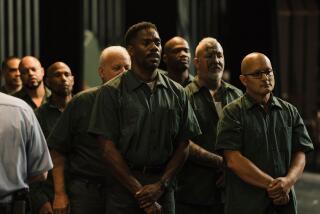‘Spratt’ at Burbage Ensemble; ‘Buzzards’ at Boyd Street; ‘Taken in Marriage’ by Actors Forum; ‘The Prisoner’ by Commonwealth Theater
George Shannon, playing the entitled salesman in “Spratt,” at the Burbage Theatre Ensemble, makes Willy Loman look like Donald Trump.
What’s fascinating about Shannon’s repulsive, macho performance is its risk--this is not a hollow salesman with a smile and a shoeshine but a buttocks-pinching male chauvinist with a sleazy grin and a yellow pallor. Shannon’s overkill turns a hackneyed play about a dreadful, frail huckster into low comedy. His aggressive attack doesn’t save the production, but it makes it curiously bearable.
Otherwise, director Ivan Spiegel stumbles with this American premiere by Toronto playwright Joe Wiesenfeld. Spratt’s cancer-ailing and devoted wife is played so forlornly by Peggy Mannix that the domestic scenes are shrouded in unrelenting gloom. Two detectives who frame Spratt for an encounter with a young retarded woman (nicely conveyed by Bridget Hoffman) continuously smirk to the point of distraction.
There is no set design worthy of the name (melodramas need sets), although lighting designer Buddy Tobie dramatically compensates with narrow-focused highlighting when Shannon is alone on stage. Ed Levey has the thankless role of a friend and attorney.
At the end, facing jail and hopelessly locked into his macho conditioning, Shannon’s Spratt is not contrite, just confused. It’s the playwright’s single affecting touch. But it comes too late.
Performances run at 2330 Sawtelle Blvd., Thursdays through Sundays, 8 p.m., through April 10. Tickets: $12; (213) 478-0897 .
‘Buzzards’
Perverse curiosity, up to a point, also earmarks “Buzzards,” a self-described Shaman drama at the Boyd Street Theater.
The show’s playwright-director and one of its featured actors, the singly named Arjuna, wrote a program note that patrons will skip at their peril. It explains that “we have created musical comic chaos” by blending “archetypes and theatrical experiments” with “the arts of the Korean Mudang (Shaman).”
The trouble is that Arjuna has staged chaos. But there’s nothing comical, and his show is devoid of any rhythmic line and momentum.
Arjuna last year staged an artful piece focused on Asian and American Indian culture called “Asian Eyes.” That show essentially had the same cultural and harmonious aim as “Buzzards.”
Win some, lose some. “Buzzards” is inventive, but it’s strident and boring.
The show is thematically and visually cluttered (notwithstanding Jay Green’s fine musical direction). The costumes are aggressively gross. The majority of actors evidence little craft, with two exceptions: the lambent Mary Ann Tamaki as a contemporary Korean woman whose life and death in hilly Tennessee propels the narrative, and the show’s vivid, bracing Kary Lynn Vail, doubling as a preacher and daughter.
Performances are at 301 Boyd St., Fridays and Saturdays, 8 p.m., through April 2. Tickets: $8.50; (213) 629-2205.
‘Taken in Marriage’
Five women gather in a church basement for a wedding rehearsal, waiting for men who never show up. Festering family wounds flare, and the free-for-all leads to an aborted marriage.
The strength in this Actors Forum production is, with one exception, the cast. The weakness is the production’s failure to turn this wooden Thomas Babe play into an ensemble performance.
Instead of an acting quintet we view too many talking heads, each taking a turn at recrimination and/or revelation. The result is a series of set pieces instead of a breezy experience. Director Peter Henry Schroeder, who stepped in with only a week’s notice after the original director had to back out, has still to work out his staging.
One character, a bemused aunt (Magda Harout), never seems to move from behind a table. Another one, a colorful wedding entertainer (the spunky, upbeat Margot Rose) flies around so much that the others resemble statues. Dialogue frequently turns to speeches, fraught with measured pacing. This production needs speed and a style that will rip the covers off.
Individually, Patricia Barry’s dim-headed but lovable mother is solid, and Sarah Kendall’s cynical, bitchy sister-to-the bride is properly chilled.
The harmful miscasting is Diane Sherry as the nervous bride. Her tentative, tremulous manner robs the character of sympathy, not to mention blood.
Performances run at 3365 1/2 Cahuenga Blvd., Fridays and Saturdays, 8 p.m., Sundays, 7 p.m., through April 10. Tickets: $10; (213) 466-1767.
‘The Prisoner’
Talking heads is also an inherent problem in late British playwright Bridget Boland’s 1954 post-World War II political drama, “The Prisoner,” staged by the Commonwealth Theater at the First Congregational Church of Los Angeles.
The psychological battle in an unnamed communist country pits an imprisoned, heroic Cardinal against the brainwashing tactics of a brilliant Marxist interrogator. The events suggest the highly publicized plight in the 1950s of Hungarian Cardinal Jozsef Mindszenty and much of Arthur Koestler’s novel, “Darkness at Noon.”
The actors--Joseph G. Medalis’ anguished Cardinal (who is broken and signs a confession of crimes against the state, just as Mindszenty did) and Bob Mendelsohn’s aristocratic interrogator--fill their roles with credulity. A supporting actor, Jay Ward as the prisoner’s jocular cell warden, gives the production added human dimension.
But director Charles Arthur can’t find a way to overcome playwright Boland’s dated, blocky structure. As the production ticktocks back and forth between the cell and interrogation room, the experience is like watching a tennis match. John Johnston’s realistic set design is too antiseptic to convey the obligatory dark mood.
The play was adapted as a British film starring Alec Guinness as the Cardinal and Jack Hawkins as the inquisitor in 1955. They received top notices in an otherwise controversial film that was praised for its brisk 91-minute running time. This two-intermission stage production could benefit from similar brevity.
Performances are at 540 S. Commonwealth Ave., Fridays and Saturdays, 8 p.m., Sundays at 2 p.m., through March 27. Tickets: $10, $7 seniors and students; (213) 385-1341.
More to Read
The biggest entertainment stories
Get our big stories about Hollywood, film, television, music, arts, culture and more right in your inbox as soon as they publish.
You may occasionally receive promotional content from the Los Angeles Times.










